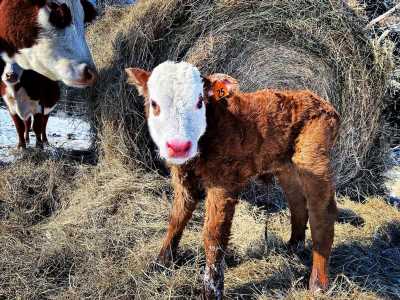CHICAGO (Reuters) – Texas ranchers worked overtime to haul water and hay to cattle to keep them alive during a freak winter storm, but some cows have already succumbed to unusual icy temperatures that also killed chickens, idled meat plants and threatened crops.
The deaths of baby cows in the top U.S. cattle state and struggles to care for surviving livestock are the latest challenges for ranchers who over the past year have dealt with COVID-19 cutting demand for meat at restaurants and shuttering slaughterhouses.
In Texas, home to more than 13 million cattle, ranchers said they are spending long, cold hours breaking up ice in water tanks and on frozen ponds so animals have something to drink. Icy conditions have turned diesel fuel into a useless gel in tractors. Ranchers said they are using gasoline-powered pickup trucks to transport hay that cattle can eat and use for warm bedding.
Kaylin Isbell, a rancher in Florence, Texas, said a few cows and sheep had died after birth. Babies are particularly vulnerable to the shock of the cold when they leave their mothers’ warm wombs covered in fluid. Isbell said her mother-in-law took newly born sheep into a spare bedroom in her home to keep them warm.
The cold will also kill oats Isbell planted for young cattle to graze on, she said. As a result, Isbell said she will need to sell the animals earlier than expected, reducing her profit margins.
Ranchers nationwide were already facing higher feed costs as corn and soybean prices soared to multi-year highs.
“We just keep going,” Isbell said. “That’s all you can do.”
Texas Agriculture Commissioner Sid Miller told Reuters that baby chicks are freezing to death because there is not enough natural gas to heat hatcheries. He said dairy operations are dumping $8 million worth of milk down the drains daily because milk processing plants are without power. Grain mills across the state cannot manufacture animal feed without power either, Miller said.
“We’ve got an animal welfare issue going on,” he said.
Major meat processors like Cargill Inc and Tyson Foods Inc said they suspended operations at some plants.
In Whitesboro, Texas, fifth-generation rancher Austin Miles said he is filling a red 300-gallon tank with water from a hose at his parents’ home two to three times a day and shuttling it to cattle to drink. The pond they would normally drink from froze, he said.
“This is extreme for us,” Miles said. “Our infrastructure was just not quite set up for these prolonged cold periods.”
The storm has killed at least 21 people across four states, and temperatures are forecast to remain 20 to 35 degrees below average across parts of the central and southern United States for days.
Cattle could suffer from respiratory problems once the deep freeze gives way to warmer temperatures, said Missy Bonds, assistant general manager of her family’s ranch in Saginaw, Texas.
“Mother Nature needs a Xanax,” she said.
Source: Read Full Article
